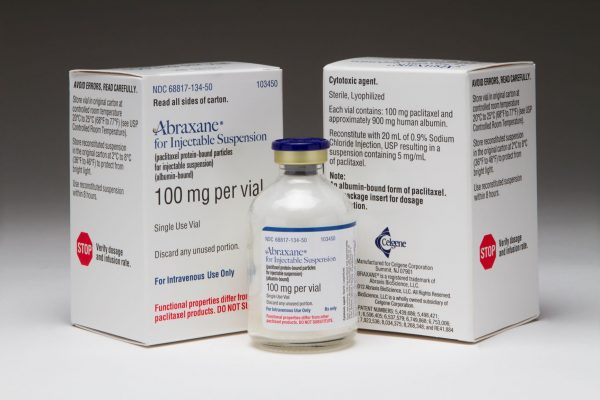
Shortly after the Food and Drug Administration approved a combination using it with the first-ever immunotherapy drug to win the agency’s nod for breast cancer, a Celgene chemotherapy agent has failed in a registration-directed trial. However, the data could still indicate a potential benefit, according to equity research analysts.
The Summit, New Jersey-based company said Tuesday that the Phase III study of Abraxane (nab-paclitaxel) combined with another chemotherapy drug, gemcitabine, in patients who had undergone surgical resection did not achieve its primary endpoint of extending disease-free survival compared gemcitabine alone. At the same time, a benefit on the secondary endpoint of overall survival was observed for the combination and achieved “nominal” statistical significance.
Cannacord analysts John Newman and Christopher Liu wrote that because pancreatic cancer is a very difficult cancer to treat, they considered any extension in overall survival to be meaningful. Abraxane has FDA approval for metastatic breast cancer, locally advanced or metastatic non-small cell lung cancer and metastatic adenocarcinoma.
Previous studies combining Abraxane with gemcitabine in other settings of pancreatic cancer have also shown an overall survival benefit. For example, a Phase III trial of the combination in metastatic pancreatic cancer showed a statistically significant benefit, with patients in the combination group showing a median OS of 8.5 months, compared with 6.7 months among those receiving gemcitabine alone, according to data published in The New England Journal of Medicine in 2013.
Celgene disclosed the news about the latest pancreatic cancer trial in the same Tuesday statement in which it announced that the FDA had given accelerated approval to Roche’s drug Tecentriq (atezolizumab) in combination with Abraxame for triple-negative breast cancer patients whose disease expresses PD-L1, the protein that Tecentriq targets. About 300,000 women are diagnosed around the world with TNBC each year. According to a 2016 study of 197 TNBC patients, about 26 percent of patients with the cancer are positive for PD-L1.
The Cannacord analysts asserted that the Tecentriq/Abraxane approval further drove home the idea that Celgene would be a good acquisition target for Bristol-Myers Squibb, which announced in January that it would acquire the company for $74 billion. “While we believe this is an incremental positive for the company, we think it reinforces the idea that [Celgene] is a company that can reach key catalysts, which could be a positive for Contingent Value Right holders should the acquisition into [Bristol-Myers Squibb] go through,” they wrote. Nevertheless, the deal has attracted dissent from some BMS shareholders.
Photo: Celgene










